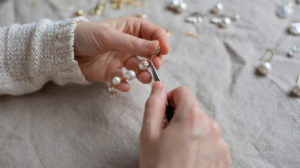Taken by Storm

Oh, so now even the weather was her fault?

I
t was on the third day of the unrelenting downpour that Avigayil first suspected something. It was eminently unreasonable, she knew, and most likely impossible. But the misgivings niggled at her.
On the morning of the fourth day, the gentler, more sporadic rain mirrored her somewhat more uplifted mood, she thought. Yet it wasn’t until she settled at the table with her morning coffee, inhaled its nutty scent, and felt her spirits lift that she was sure. Because as she felt the knot of tension in her shoulders melt away, the clouds parted, and improbably, a shaft of sunlight pierced the fog blanketing the neighborhood and sparkled off the raindrops on her lawn.
Avigayil knew, of course, that she was off her rocker. But the illusion persisted, and when she felt cheerful enough to sing with her toddler when he awoke refreshed from his nap, a gentle sun burned away the fog, and a warm breeze the neighborhood hadn’t enjoyed for days caressed her rhododendron bushes.
In the days that followed, Avigayil’s suspicions deepened to an awful certainty. She wasn’t sure if she should laugh or cry the day her husband asked casually, “Nasty weather this morning. Why such a rotten mood?”
Sensing her uncertainty, the sky obliged with the most bizarre sun shower.
Avigayil slumped in her seat. “When did you realize?” she asked.
“I’m not sure,” said Moish. “Maybe my first clue was the night I forgot our anniversary?” The gale, Avigayil recalled, had been epic. She decided the time had come to bare her heart.
“It’s not fair,” she told him. “All those classes about how a woman sets the tone for the home and has the secret power to affect everyone — I always had a hard time with that. Why put all the responsibility on me? But this —” she gestured broadly to include the house, the low precipitation supercell hovering overhead, the whole tri-state area in general — “this is just ridiculous.”
“With great power comes great responsibility,” intoned Moish. Avigayil threw her oven mitt at him. It landed near the stovetop that was boiling his water for coffee and burst into flames. Moish beat it out and gazed pensively at the charred remains. “Do women not like to feel powerful?”
“The weight of the world is on our shoulders. But no pressure!” said Avigayil.
Whom do you approach when you realize that the weather is linked to your mood?
A shrink was the obvious answer, but Avigayil was understandably reluctant.
“Maybe we’re overreacting, and this is really just normal stuff. I think we first need some data,” said Moish. “Remember Uncle Kalman’s cousin, the meteorologist? I’m going to ask him what he thinks, objectively.” He scrolled through his contacts.
“Objectively, does my wife need a padded cell yet, or can it wait?” muttered Avigayil. Her voice was drowned out by the ringing of her husband’s phone.
Following an arcane menu tree from Albuquerque Meteorological Consultants to Dr. Alvin Pernikoff’s direct extension was the work of several minutes, but soon Moish flashed her a triumphant thumbs-up as the eminent scientist himself came on the line.
Moish started telling their story haltingly, but soon warmed to his subject. Avigayil listened as her husband described the recent weather to his bemused listener.
“There’s no question that we’re seeing some abnormal weather patterns centered over Ocean County,” agreed Dr. Pernikoff. “There’s an anomalous Copernican cumulus formation effect, plus some hemispheric contiguous lateralization. At the same time, we’re seeing a correspondence between the actual weather and our forecasts that, while not zero, is close enough to it to be statistically indistinguishable.”
“In other words, you have no clue what’s happening?” asked Moish.
“In a closed system, I think that would be an overestimation of the arithmetical certainty—” began the meteorologist.
“Okay, okay, I got you,” said Moish hastily. “Thanks so much. Give my best to Ellen and the kiddos.”
And then, turning to Avigayil, “Congratulations, you’re a scientific abnormality.”
Avigayil was in a spectacular funk for the next two weeks, and the weather responded with a bout of rain, wind, and unseasonable hail.
“It’s not fair,” she griped to Moish as they drove. “Everyone else is allowed to be grumpy sometimes, except me.”
Moish attempted to be reasonable, which turned out to be a tactical error. A hailstone the size of a tennis ball nearly shattered the windshield.
“I’m sorry,” he said sincerely. “I don’t think I appreciate how hard it is to take responsibility for the experiences of everyone within a 50-mile radius. I hope tonight brings us some insight.”
He shifted into park, and they darted up the windswept path to the front door.
“Ready?” he asked, knocking lightly.
Rabbi Jundef ushered the couple into his study and waited expectantly.
As Moish spoke, the rav listened intently, his face a study in nonjudgmental undivided attention.
“So to clarify, Reb Moshe, you’ve ascertained that our weather is stumping the National Weather Service? And you’re convinced that it’s your wife’s moods that are causing the disturbance?”
Moish nodded miserably.
For several long minutes, the room was silent except for the sound of the fat raindrops pelting the study window.
“Well,” said the rav finally, cracking his knuckles. “This is certainly a change from the fleishig-spoon-in-the-milchig-pot variety.” He tugged his beard thoughtfully, leaving one corner considerably longer than the other.
“I suggested that she view it as an opportunity to become a better person,” offered Moish hesitantly.
“I don’t want to be a better person!” wailed Avigayil. The cracking thunder set off several car alarms, and Moish shifted awkwardly.
“I mean, of course I do, but I don’t want to be forced to become a better person in this way,” amended Avigayil. “It’s just not fair.” Avigayil was vaguely aware of how much she sounded like a petulant preschooler, but she couldn’t bring herself to care very much.
“Mrs. Resnick, there’s no precedent in the seforim for the exact scenario we have here.” The rav paused, then spread his hands wide in a gesture of helplessness. “I know that’s not the answer you were hoping for. And really, I wish I could be that rebbe who could look into the depths of your soul and tell you your tikkun. But I wonder whether you’ve been too hard on yourself — shouldering too much responsibility. Before this... situation, you never really were responsible for anyone but yourself, you know.”
“But... eishes On ben Peles! And Dinah marrying Eisav! And all the tzidkaniyos in Mitzrayim…”
Rabbi Jundef nodded. “Doing the right thing can have far-reaching effects. But controlling everyone around you is not in the official job description.”
Avigayil looked at the lime green door and then back at Shaul. How had she even gotten into this mess?
It had been only two days since her brother Shaul had arrived, and Avigayil was already regretting confiding in him. He’d made their home on the East Coast his headquarters for bein hazmanim, reassuring their parents that he would stay out of the way except when he was being helpful.
Now that his shidduch had crashed and burned, though, he’d found himself with entirely too much time on his hands, and Avigayil thought he could use a good review of the promised terms and conditions of his visit.
“Okay, here goes nothing,” Shaul had announced. “Dr. Stefan Papondopolous, MnD, KcAP, Institute of Paranormal Meteorology. He lives in the Bay Area and he’s off the grid because, and I quote, ‘standardized electrical currents interfere with ontological levels of meteorological vibrations.’ ”
“Paranormal meteorology?” Avigayil had asked. “Is that even a thing?”
“I don’t think so,” Shaul had conceded, “since he was the only practitioner I could find. But I couldn’t find anything else even remotely relevant. What do you say we head out there and look him up?”
“I can just picture it: Mommy, Abba, do you mind moving in for a few days? I’m not sure where we’re going or when we’ll be back, but Moish and I have this small thing we need to take care of...” Avigayil’s voice trailed off in a snort.
“Well, you can’t go alone,” Moish had pointed out.
“Of course not,” Shaul had said, smiling brightly. “I’m going with her.” After that things had happened rather too quickly for Avigayil to process, and now she was facing this ridiculous door and she couldn’t even bring herself to knock.
Shaul leaned forward and rapped sharply.
Almost instantaneously, it swung open, but Avigayil didn’t see anyone. Belatedly, she realized that was because the door-opener was only about knee-high.
A small girl in zebra-striped footsie pajamas was wearing an inverted colander over her head, with just a small, pointed chin showing below. Various artisanal shapes of pasta protruded from the colander’s holes.
“Is Dr. Papandopolous home?” asked Shaul.
“Daddy has been captured by the evil fairies,” replied the small zebra, her voice echoing slightly in her metallic headgear.
“Uh... should we come back later then?”
“Evil fairies,” she replied firmly, and the door swung shut with a rather final thud. Shaul and Avigayil looked at each other, then at the door. Shaul knocked again and rang, but it soon became evident that no response was forthcoming.
She shouldn’t have expected anything better on this wild goose chase, Avigayil told herself glumly as she cooled her heels in the lobby of the local Chabad house while Shaul davened Minchah. She wandered aimlessly around the brightly lit hall, glancing over signs advertising the community-wide Havdalah concert scheduled for next week, reminders to place Pesach orders early to ensure availability, and congratulations to the Loeb family on the bar mitzvah of Eddie. And then she saw it.
“‘Whatever the Weather,’” read the pink notice. “Bracha Shira Robinson shares her miraculous tale of Heavenly response to her emotions.” Avigayil’s pulse quickened, and she was still staring, frozen, at the sign when Shaul joined her some ten minutes later. With a trembling hand, she pointed out the date to him — it had been three days before.
Their Uber to the airport was a prolonged frenzy of Googling and phone calls, and even before they pulled up at the terminal, they had the address of the Robinson residence in Pasadena.
Bracha Shira Robinson was exponentially more vibrant in life than she’d appeared in her publicity headshot. Her elaborate tichel, a riot of sea-green and blue, was shot through with golden threads, and the intertwining — were those eels? — on her earrings coordinated with the Escheresque-patterns of sea life undulating on her sweeping dress.
Avigayil realized a moment too late that she must have been gawking, because Bracha Shira began to expound on the connection of the sea to the sky to the Throne of Glory.
“But surely that’s not why you came!” exclaimed Bracha Shira after a moment. “Why don’t you come in and tell me about it.”
Before Avigayil or Shaul could utter a word, they found themselves ushered into a cozy kitchen, all warm woods, earthy smells, and trailing houseplants. Motivational magnets and quotes vied for attention in the most unlikely nooks and crannies. “Dry roses need also water,” declared a hand-lettered note above the sink. “Keep climbing,” urged a chalkboard precariously balanced above the extensive collection of herbal teas.
Bracha Shira placed a large slab of brownie (made of organic black beans, Avigayil presumed) and a steaming mug of tea in front of each of her guests. “Make a brachah — it’s shehakol,” she urged. Avigayil did, and her guess was confirmed, though the cake was surprisingly delicious anyway.
She shot a pleading look at Shaul, who did the chivalrous thing and cleared his throat. “It’s like this...”
Bracha Shira listened attentively, nodding vigorously and generally not appearing the least bit surprised. When Shaul finished, she nodded a final time. “But what do you want from me?”
Avigayil blinked. “Well, it sounds like you’ve been dealing with this for a while. We were wondering if you found anything that worked at all.”
“Worked?” asked Bracha Shira, not comprehending.
“You know, to make it stop. At least a little, or temporarily, or something,” said Avigayil.
Bracha Shira’s face was a study in perplexity. “Let me get this straight. For a brief instant, the curtain has been pulled back, showing us the impact we have in the Upper Realms, and you want to give up this gift?” she asked.
“Yes.” Avigayil’s reply was instantaneous. “It’s too much for me. I don’t want to know how I’m making the malachim cry. I just want to be normal.”
Normalcy was evidently not a goal that Bracha Shira held in high regard. Her eyebrows disappeared under the glimmering embroidery of her tichel, and there was a low rumble of distant thunder, but she quickly collected herself and put a comforting hand on Avigayil’s shoulder.
“Don’t worry, I can help you! It’s like pottery-making or baking with sprouted grains — it’s not so difficult once you begin to apply yourself to it,” she said reassuringly. “In the beginning, we were having the wildest weather swings, but by now we have sun over 90 percent of the time!”
“You mean, becoming a tzadeikes is my only way out of this mess?” Avigayil was aghast.
Shaul smacked his forehead. “We’re doomed!”
Bracha Shira’s smile wavered only the tiniest bit. “You know that the tzaddikim have encouraged us to believe in ourselves and our inherent goodness,” she said.
“I have heaps of inherent goodness,” Avigayil said firmly. “But this is not the way I want it actualized.”
“You understand, though, that whether or not — no pun intended — the weather mimics your mood, you still affect everyone around you, right?” asked Bracha Shira.
“Sure, we all affect others, but my husband doesn’t have to carry that burden, no one’s giving Shaul that guilt trip. I’d just like to go back to normal, please.”
“A burden!” exclaimed Bracha Shira. “It’s a priceless opportunity. You’re driving a 20-ton semi-trailer down the... the superhighway of life! And here’s a GPS with real-time satellite updates giving you feedback and steering you right and helping you avoid obstacles!”
Avigayil thought about this. “I think you’re wrong, Mrs. Robinson,” she said, surprising even herself. “Rabbi Jundef would say you’re making me too powerful.”
Shaul seemed to recall his brotherly responsibilities just then and took the reins of the conversation. “I don’t know who’s right, Mrs. Robinson, but what we’re discussing now is the reality, not the ideal. Avigayil doesn’t want it, and we want to know if you can help her get rid of it or not.”
Bracha Shira opened her mouth, then seemed to think better of it. For a few long minutes, an oppressive cloud covered the sun, leaving the small kitchen — which Avigayil noticed had no electric lights on — in a gathering gloom. Finally, she shrugged and turned to the living room. “Feivel?” she called. “A minute?”
Feivel Robinson needed to stoop to clear the doorway, and it seemed to Avigayil he needed to turn slightly sideways to slide his girth in, too. At least 6’6”, with a sandy beard, swinging peyos behind his ears, and thinning hair, he seemed to take up the whole room, but he radiated calm dependability as obviously as his wife buzzed with barely-suppressed energy.
“Mrs. Resnick here is experiencing the ethical-atmospheric transmutation flux. Feivel is the one who first identified it in his post-graduate research at MIT,” she added as an aside to her guests. “But for some reason” — Avigayil could still hear the incredulity in her tone — “she’d like to reverse the effect. Can you help her?”
Feivel smiled a slow, ponderous smile, and for the first time in weeks, Avigayil felt hope coursing through her. What followed was a slow and detailed ten-minute scientific and metaphysical discourse that Avigayil didn’t even make a pretense of trying to follow, but she did register the bottom line: Mr. Robinson knew how to fix her problem.
“—electrical transference sublocution,” he finished. “Does that make sense to y’all?”
Shaul nodded slowly, thoughtfully.
“Not even a little bit,” announced Avigayil ecstatically. “But you can fix me! You can really fix me!”
Mr. Robinson gave his slow smile again. “I think so. Yes, I think that does sum things up fine.”
“So, the maskanah is that something made in a sub-standard Chinese factory came into the Resnick house with a faulty circuit, and when it came into contact with water it shorted out and did this transference gesheft?” asked Shaul.
Mr. Robinson smiled again. “Yup.”
“So we’re heading home to find something you dropped into the bathtub two months ago.” Shaul slapped his hand forcefully onto the table, though the effect was somewhat mitigated when it landed in his partially-eaten cake. “Let’s do it!”
“Goodbye, Avigayil,” said Bracha Shira, walking them to the door. “You’re driving a great big rig loaded with emotion. Do you really prefer to do that with your eyes closed?”
The clouds parted and shifted with startling rapidity, alternating between sun and showers with impressive speed as Avigayil shared with her husband the highs and lows of her expedition.
She broke off mid-sentence as three-year-old Mordy, who still hadn’t quite gotten over his delight at his mother’s sudden return, sidled into the room, clutching his latest transitional object: a bedraggled stuffed bird that croaked “zeh kaparasi” when its tummy was palpitated.
Moish followed her gaze, and Shaul looked up inquiringly from his phone.
“The chicken!” they chorused. Avigayil suddenly recalled that the unfortunate fowl had, indeed, been subject to the indignity of a bath, when Mordy had decided it needed to be clean before participating in the holy minhag.
Moish lunged for the toy in the boy’s hand. “Tatty needs that for a minute,” he coaxed. Mordy clutched the bird protectively to his chest.
“Mordy needs dat,” said Mordy pleasantly. He used his free hand to wrap his mother’s skirt tightly around himself.
“Here, why don’t you show us how the Magna-Tiles stick to the fridge.” Moish waved a Magna-Tile vigorously in an enthusiastic demonstration of the fridge’s magnetic properties. Eyeing his father suspiciously, Mordy grudgingly stuck a tile to the refrigerator door, never releasing his death-grip on the chicken’s neck.
“I’ll do it,” said Avigayil, kneeling next to her tot. “Mords, do you remember how the chicken was going to remind us to do a big mitzvah?” Mordy nodded warily, trying to see where this was going.
“Well, zeeskeit, now it’s time for the chicken’s big mitzvah.” Avigayil gently opened her son’s fingers. Mordy looked unconvinced, but he did not resist.
Her husband and brother looked on as Avigayil gingerly lifted the garishly colored toy. With trembling fingers, she slid the switch to off. The clouds, which had been swelling and roiling on the brink of a storm, seemed somehow to lose interest and go back to minding their own business. A wave of euphoria seized her.
For good measure, she took out the batteries too.
It was late, past everyone’s bedtimes, and the kids were all miraculously asleep. Avigayil pulled her coat tighter around her as she headed down to the curb, hefted the toy chicken in her hand, then cocked her arm to toss it into the dumpster. And paused as fragments of memory poured over her in waves.
Moish’s defeated look the day he’d lost a big account. Her younger son, Chaim, recounting the resentment he felt toward his rebbi. Her daughter Menucha’s tear-streaked face the day Daniella had snubbed her in front of the whole class.
She thought about her helplessness in the face of their pain, her vain and desperate desire to make things better for them.
She looked at the feathery blob in her hands as if seeing it for the first time. She tucked it under her arm and pivoted, walking back up the driveway. And she found a place for it behind some boxes of winter gear in the garage, just in case.
She was fairly certain she was ready to be just another humble wife and mother again, without running the world. But once in a while, Avigayil supposed, superpowers could come in handy. Besides the ones she already had, of course.
(Originally featured in Family First, Issue 676)
Oops! We could not locate your form.












